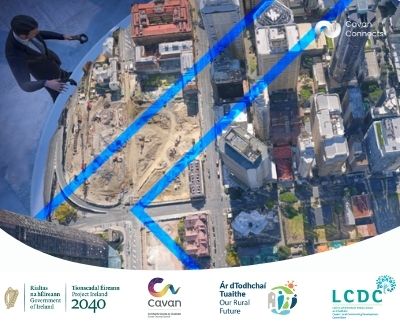


At Cavan Monaghan Science Festival
Cavan Connects invites community members, innovators, and public service professionals to attend “Exploring How VR Can Support Public Services and Community Engagement”, an exciting event taking place on Thursday, November 13th at 11:00 AM in the Johnston Central Library, Cavan. This event brings together pioneers in digital innovation to demonstrate how Virtual Reality (VR) and Artificial Intelligence (AI) can create dynamic, inclusive, and interactive spaces for public engagement and community growth.
Virtual Reality (VR) is revolutionizing the way public services train personnel and engage communities. In combination with Artificial Intelligence (AI) It offers immersive, cost-effective, and emotionally powerful experiences that improve understanding, readiness, and collaboration across sectors.
VR allows government agencies and emergency services to simulate real-world challenges safely and effectively. VR enables realistic scenario simulations for firefighters, medical personnel, and law enforcement officers, helping them develop critical decision-making and coordination skills without exposure to danger.
Key benefits include:
Immersive, risk-free practice: Trainees can handle complex, high-risk situations like disasters or crime scenes in controlled virtual environments.
Higher engagement and retention: Studies show that VR training improves knowledge retention and response confidence by immersing learners in active problem-solving.
Collaborative teamwork: Multi-user environments help emergency teams refine coordination, communication, and leadership under pressure.
Scalable accessibility: Agencies can deliver standardized training sessions across regions without duplicating costly physical setups.
Overall, VR enhances preparedness, improves public safety outcomes, and reduces long-term costs for governments and local authorities.
Beyond training, VR empowers communities by enabling participatory planning and empathy-driven engagement. Research in the International Journal of Instruction found that immersive VR experiences foster empathy, boost community participation, and change attitudes toward social issues such as homelessness.
Key benefits for communities include:
Inclusive decision-making: Citizens can virtually explore proposed infrastructure or environmental projects before they are built, improving transparency and trust.
Empathy and awareness building: Immersive storytelling allows participants to experience life from different perspectives, leading to greater understanding of vulnerable populations.
Interactive public consultation: VR enables people to attend virtual town halls or planning sessions, making civic participation easier and more engaging.
Enhanced accessibility: Individuals unable to attend physical meetings, due to mobility, geography, or time constraints, can participate virtually, ensuring a more representative voice in policy discussions.
Ultimately, VR helps governments and communities collaborate more effectively, train more efficiently, and design more empathetic public spaces. It transforms public services from being reactive to proactive; making civic engagement immersive, inclusive, and future-ready.